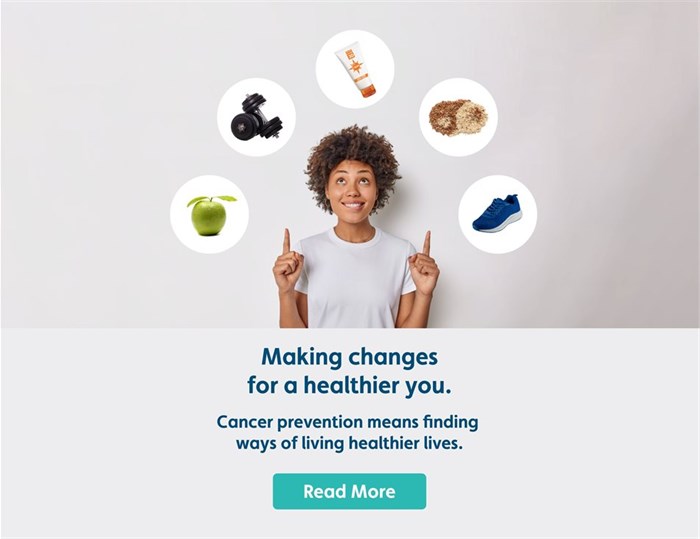Reduce your risk of cancer - small changes for a big difference

Reducing your risk of cancer may be easier than you think. By making healthy choices, you can lower your risk of getting many kinds of cancer. Screening tests can find some cancers early when treatment works best. Vaccines can help prevent several types of cancer. These suggestions can help lower your chances of developing cancer, make you feel better, and improve your quality of life.
1. Healthy choices
You can reduce your risk of getting cancer by making healthy choices like keeping a healthy weight, avoiding tobacco, limiting the amount of alcohol you drink, and protecting your skin.
2. Don’t smoke or use tobacco products and avoid secondhand smoke
It is the most significant cause of cancer worldwide. Tobacco use can cause cancer almost anywhere in your body. Tobacco does not only cause lung cancer. Smoking tobacco products (including cigarettes and cigars) causes nearly nine of every 10 lung cancer cases. But tobacco use can cause cancer almost anywhere in your body:
- Bladder
- Blood (acute myeloid leukemia)
- Cervix
- Colon and rectum
- Esophagus
- Kidney and renal pelvis
- Liver
- Lungs, bronchi, and trachea
- Mouth and throat
- Pancreas
- Stomach
- Voice box (larynx)
3. Maintain a healthy weight and be active
Being overweight or obese is one of the most significant risk factors for several types of cancer. These cancers include:
- Adenocarcinoma of the esophagus
- Breast (in women who have gone through menopause)
- Colon and rectum
- Uterus
- Gallbladder
- Upper stomach
- Kidneys
- Liver
- Ovaries
- Pancreas
- Thyroid
- Meningioma (a type of brain cancer)
- Multiple myeloma
Being overweight or obese doesn't mean that someone will get cancer. But it does mean that they are more likely to get cancer than if they kept a healthy weight.
4. Avoid or limit alcohol
The less alcohol you drink, the lower your risk of cancer. If you choose to drink, drink no more than one drink a day (for women) or no more than two drinks a day (for men). Drinking alcohol raises your risk of getting six kinds of cancer:
- Mouth and throat
- Voice box (larynx)
- Esophagus
- Colon and rectum
- Liver
- Breast (in women)
All alcoholic drinks, including red and white wine, beer, and liquor, are linked to cancer.
5. Eat a healthy diet
No single food can protect against cancer. However, a diet full of whole diverse foods, such as fruit, vegetables, whole grains, legumes, spices, healthy fats, fresh fish, high-quality dairy, and lean protein, may reduce cancer risk. Conversely, processed meats, refined carbs, and salt may increase your risk.
- Limit salt intake (<5g/day) to reduce the cancer risk.
- Include sources of fatty acids, especially omega-3, in your diet.
6. Protect your skin
Avoid sunbeds or being in the sun between 10 am and 3 pm. Wear UV-protective clothing, glasses and apply sunscreen regularly.
7. Get vaccinated, go for regular check-ups, and do self-examinations
Infections like Hepatitis B, C, and Human Papilloma Virus (HPV) cause up to 20% of cancers. Vaccines can help to lower cancer risk. The human papillomavirus (HPV) vaccine helps prevent most cervical cancers and several other kinds of cancer. The hepatitis B vaccine can help lower liver cancer risk.
8. Go for regular cancer screenings
Getting screening tests regularly may find breast, cervical, and colorectal (colon) cancers early when treatment is likely to work best. Lung cancer screening is recommended for some people who are at high risk. Knowing your family’s medical history is also strongly advised.
Ready for change? Take action for your health.
Now that you have read how making small changes to your diet and lifestyle can benefit your health and help protect yourself from cancer, we hope you feel inspired. Undoubtedly, you will already make some of the checklist points. For others, making small changes to your lifestyle could make a big difference to your health. Smart choices can help you reduce your cancer risks. Balance your lifestyle today for a lower cancer risk tomorrow. Need to talk to a doctor, make a booking online.
Sources and references consulted
- Intercare Classic Road Race 2025: Run with your heart for your health28 Oct 11:04
- Intercare launches 'Greater than stroke: A journey to recovery' campaign25 Oct 11:59
- Intercare Day Hospitals co-payment discounts on medical and dental procedures11 Oct 15:02
- Intercare Group celebrates the success of the Intercare Blouberg Marathon and announces beneficiaries09 Sep 11:48
- A people-centred approach to honour inclusivity within Intercare Group16 Aug 13:46








